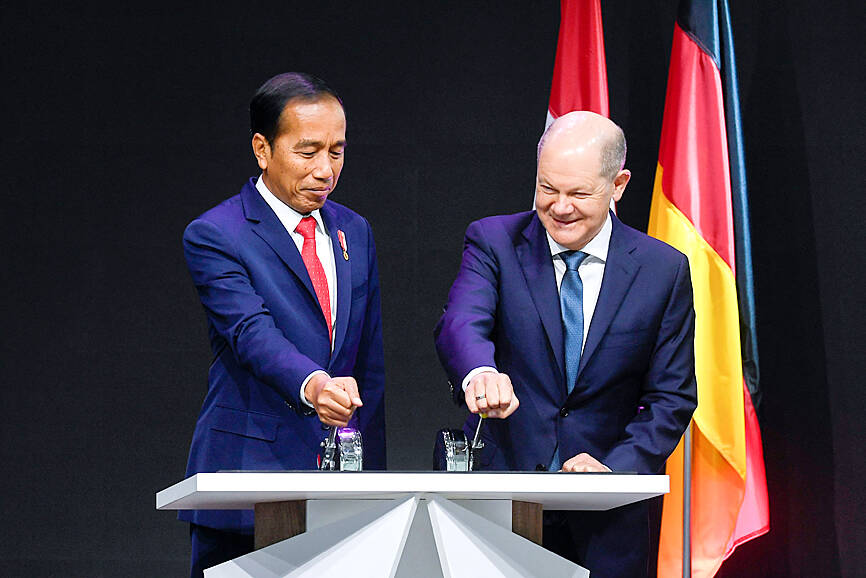German Chancellor Olaf Scholz on Sunday said that he would press for a trade agreement between the EU and Indonesia as part of his country’s efforts to reduce its reliance on China for crucial raw materials.
Speaking at the opening of the annual Hannover Messe trade fair, Scholz told Indonesian President Joko Widodo that a trade deal between Southeast Asia’s most populous nation and the 27-nation bloc would create an economic area with 700 million people.
“I am working to finally get this agreement across the finish line,” Scholz said of the negotiations between Jakarta and Brussels, which have been ongoing since 2016.

Photo: Reuters
The German leader said he was similarly hopeful about talks between the EU and the Mercosur bloc in South America, as well as Australia, Kenya, Mexico and India.
“Here too, a whole new dynamic has emerged in recent months,” he said, adding that such agreements were necessary to help countries reduce their dependence on particular markets.
Germany is particularly concerned about becoming too reliant on China, including for crucial commodities needed for digitalization and the shift toward a zero carbon economy.
“At the moment we import many of them from China,” Scholz said.
“And that’s despite the fact that rare earth, copper or nickel are often not extracted there, but in countries such as Indonesia, Chile or Namibia,” he said. “We want to change that.”
Building processing facilities for such raw materials in the countries where they are found would benefit the local economy and should be part of any new trade deal, he said
Indonesia is the partner country of this year’s Hannover Messe, one of the world’s largest trade fairs.
At the fair, Federation of German Industries president Siegfried Russwurm yesterday said that China is and will remain a key market for German companies.
“We have a broad consensus that we need China,” Russwurm said.
Additional reporting by Reuters

Taiwan Semiconductor Manufacturing Co (TSMC, 台積電) yesterday said that its investment plan in Arizona is going according to schedule, following a local media report claiming that the company is planning to break ground on its third wafer fab in the US in June. In a statement, TSMC said it does not comment on market speculation, but that its investments in Arizona are proceeding well. TSMC is investing more than US$65 billion in Arizona to build three advanced wafer fabs. The first one has started production using the 4-nanometer (nm) process, while the second one would start mass production using the

‘SILVER LINING’: Although the news caused TSMC to fall on the local market, an analyst said that as tariffs are not set to go into effect until April, there is still time for negotiations US President Donald Trump on Tuesday said that he would likely impose tariffs on semiconductor, automobile and pharmaceutical imports of about 25 percent, with an announcement coming as soon as April 2 in a move that would represent a dramatic widening of the US leader’s trade war. “I probably will tell you that on April 2, but it’ll be in the neighborhood of 25 percent,” Trump told reporters at his Mar-a-Lago club when asked about his plan for auto tariffs. Asked about similar levies on pharmaceutical drugs and semiconductors, the president said that “it’ll be 25 percent and higher, and it’ll

When an apartment comes up for rent in Germany’s big cities, hundreds of prospective tenants often queue down the street to view it, but the acute shortage of affordable housing is getting scant attention ahead of today’s snap general election. “Housing is one of the main problems for people, but nobody talks about it, nobody takes it seriously,” said Andreas Ibel, president of Build Europe, an association representing housing developers. Migration and the sluggish economy top the list of voters’ concerns, but analysts say housing policy fails to break through as returns on investment take time to register, making the

CHIP BOOM: Revenue for the semiconductor industry is set to reach US$1 trillion by 2032, opening up opportunities for the chip pacakging and testing company, it said ASE Technology Holding Co (日月光投控), the world’s largest provider of outsourced semiconductor assembly and test (OSAT) services, yesterday launched a new advanced manufacturing facility in Penang, Malaysia, aiming to meet growing demand for emerging technologies such as generative artificial intelligence (AI) applications. The US$300 million facility is a critical step in expanding ASE’s global footprint, offering an alternative for customers from the US, Europe, Japan, South Korea and China to assemble and test chips outside of Taiwan amid efforts to diversify supply chains. The plant, the company’s fifth in Malaysia, is part of a strategic expansion plan that would more than triple